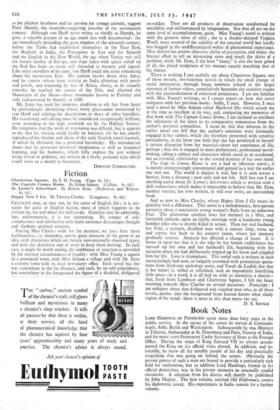Fiction
Chatterton Square. By E. H. Young. (Cape. 9s. 6d.)
Happy Now I Go. By Theresa Charles. (Longmans. 9s. 6d.)
GENTILITY may, or may not, be the curse of English life ; it is cer- tainly the curse of English fiction, most of which happens to be written by, for and about the well-to-do. Gentility may be admirable, but, unfortunately, it is not interesting. Its temper of self- complacency and satisfaction with finite existence discourages thought and slackens spiritual tensions.
Putting Miss Charles aside for the moment, we have here three backboneless, i.e. themeless, novels quite innocent of the germ of an idea, with characters which are merely conventionally observed types, and with the sketchiest sort of story to keep them moving. In each case, it might be worth noting, the semblance of structure is provided by the exterior circumstances of locality : with Miss Young a square in a provincial town, with Miss Ashton a village and with Mr. Eton a country town with its local newspaper office. Each novel has the- war somewhere in the far distance, and each, by an odd coincidence, has somewhere in the foreground the figure of a disabled, disfigured
ex-soldier. They are all products of observation uninformed by sensibility and unilluminated by imagination. Not that all are on the same level of accomplishment, quite. Miss Young's novel is written with the greatest sense of style ; she is a thicker-skinned Virginia Woolf, more assured of the stability of the external world but hardly less bogged in the undifferentiated welter of phenomenal experience. Miss Ashton has greater objective clarity of perception, and makes the bravest effort to tell an interesting story and touch the skirts of a problem, while Mr. Eton, if the least " toney," is also the least gifted of all, the placid stodginess of his manner exactly matching that of his matter.
There is nothing I can usefully say about Chatterton Square, one of those myopic, too-feminine novels in which the small change of social intercourse, through being nowhere related to the larger currency of human values, cumulatively benumbs the sensitive reader with the tintinnabulation of reiterated pettinesses. I am not familiar with Miss Young's writings, so I cannot report on how this novel compares with her previous books : badly, I trust. However, I once read' a novel by Miss Ashton called Mackerel Sky which struck me at the time as excellent in its way, and, comparing my memories of that book with The Captain Comes Home, I am inclined to attribute the inferiority of the latter to its comparative remoteness from the author's personal sympathies. I mean by this that whereas in the earlier novel one felt that the author's emotions were intimately engaged in her subject, which she therefore presented with sensitive particularity, in the latter one feels that she has permitted in herself a certain alienation from her material—from her experience of life, perhaps ; that she is engaged in mere perfunctory, professional novel- making, taking a subject and characters which stand in an accidental, not an essential, relationship to the inward motions of her own mind. The Cap, in Comes Home is not a bad or offensive novel ; it is merely uninterestingly conventional and genteel in a way the earlier one was not. The world it depicts is real, but it is seen across a barrier, from a distance ; seen only and not felt. Still less can I say anything useful about St. Lynne's Advertiser, which is written with a dull ordinariness which makes it impossible to believe that Mr. Eton, another veteran, has ever written, or will ever write, an outstanding book.
And so now to Miss Charles, whose Happy Now I Go wears its gentility with a difference. This novel is a melodramatic, first-person narrative about a narcissistic young woman's flight from an unknown Fear. The glamorous creature loses her memory in a blitz, and forthwith embarks upon an idyllic marriage with a. handsome young bomber pilot who is shortly killed in action. Then her real husband, her Fear, a taciturn, disabled man with a sinister limp, turns up and carries her back to his country estate, where her memory gradually returns. Amnesia has effected a change of heart. It is borne in upon her that it is she wbo by her female caddishness has messed up her own and her husband's life, beginning with the occasion when she had deliberately tripped up his horse and crippled him for life. Love is triumphant. This awful tosh is written in such excruciatingly bad taste, so vulgarly crammed with pretentious quota- tions from third-rate anthology poets, and Yseult de Ludith (for that is her name) is, wilful or reformed, such an impudently horrifying little piece—in a word, it is all laid on with so shameless a shovel— that, fresh from Lambscot and Chatterton Square, I felt my heart warming towards Miss Charles on several occasions. Postscript : I am unhappy about that disfigured and crippled man who, in all these novels, pushes into the foreground from heaven knows what shady region of the mind : there is more in this than meets the eye.
D. S. SAVAGE


































 Previous page
Previous page